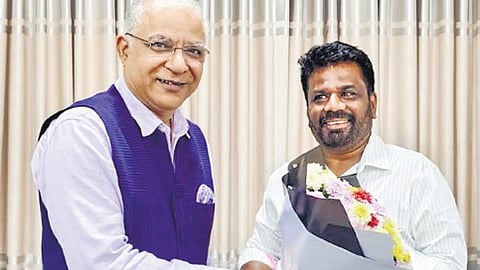

While everyone expected the National People’s Power (NPP) to win the Sri Lankan parliamentary elections, the party’s spectacular scale of victory in the results declared on Friday has surprised many.
For the first time after the introduction of the new Constitution in 1978, which brought in the unicameral parliament, a single pre-poll alliance has won more than two-thirds majority.
NPP has secured 159 of 225 seats (141 elected members and 18 through the national list based on proportional representation) in the parliament in the elections held on Thursday.
However, more importantly, this is the first time in the country’s history that a Sinhalese-majority formation, without the support of any established Tamil entity, has emerged as the leading party in regions with predominantly ethnic minority population.
The sole exception was Batticaloa, where the Ilankai Tamil Arasu Katchi (ITAK), the largest Tamil party, won three of the five seats while NPP and Sri Lanka Muslim Congress (SLMC) won one each.
‘Disgruntlement with Tamil parties key factor for surprise outcome in SL polls’
In Jaffna, the nerve centre of Tamil nationalist politics, NPP won three of the six seats while ITAK, All Ceylon Tamil Congress (ACTC) and an independent group, led by Ramanathan Archuna, a lesser-known doctor who projected himself as an anti-corruption crusader, won one seat each.
In the other Tamil-dominated electoral districts of Vanni, Trincomalee, and Nuwara Eliya and Badulla (where hill country Tamils live) and Ampara (which has a mix of Tamil, Sinhalese and Muslims population), NPP has emerged as the topper.
A senior journalist with a popular Jaffna-based Tamil newspaper, who did not want to be named, said a Sinhalese-dominated formation getting a majority in the electoral district was “beyond one’s wildest imagination”. He, however, said that another way to look at it would be that the two seats previously held by Angajan Ramanathan and Douglas Devananda, who always sided with the ruling establishment, have gone to the NPP.
“In a way, it is just a consolidation by the NPP that rode a popular wave,” he said, pointing out that Devananda of the Eelam People’s Democratic Party has lost for the first time since 1994.
Terming the outcome as interesting and surprising, Mahendran Thiruvarangan, senior lecturer attached to the University of Jaffna, said that the key factor that contributed to this was the disgruntlement with the Tamil parties, owing to infighting and their failure to deliver politically and economically.
He added that apart from their promise on fighting corruption and economic revival, the NPP positioned itself as an inclusive alliance that followed a non-discriminatory approach ahead of the elections without trying to fuel racism to seek votes.
He, however, expressed concern about the weak opposition that has emerged in the election, especially the defeat of MA Sumanthiran in Jaffna, an articulate leader of ITAK, and was skeptical about the ability of the weakened opposition to play a constructive role. When asked if people of the north preferring a national party over a Tamil party was an indication that they no more see the political solution to Tamils as an important problem, he said it is a not a rejection of Tamil political question, but an articulation that the political question cannot be seen in isolation without the economic question.
Sivagnanam Shritharan, the president of ITAK and the only person from the party to get elected in Jaffna, acknowledged that time and nature have provided the NPP with a “historic mandate” never seen before in the country, including from the Tamil people. He said, this has, however, placed a huge responsibility in the hands of the NPP.
With the two-third majority, he said he wanted NPP to deliver on the Tamil issues of devolution of powers under a federal structure and powers over land. Arguing that the economic downturn the country faces now was also because of the huge costs of the military and war, he said if the NPP acts arrogantly and fails to deliver on these issues, it may end up dividing the country further.
Though Shritharan acknowledged that the fraternal fighting within Tamil parties and even within his own party had caused disillusionment among people, he said the silver lining is that the ITAK has emerged as the third largest party with seven seats to effectively articulate the problems of Tamils in a united voice, which will also help in strengthening the party further.
Award-winning writer Mu Sivalingam, a hill country Tamil living in Kotagala in Nuwara Eliya district, where the NPP won five out of eight seats, said he supported the NPP this time, owing to the frustration with the traditional parties that represented the hill country Tamils. But he added that considering the Sinhala majoritarian past of JVP, the party leading the NPP, he is worried about the alliance’s brutal majority. “I hope they will use it constructively and ensure land rights to hill country Tamils,” he said.